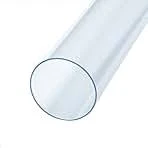Ott . 21, 2024 22:17 Back to list
Understanding the Applications and Benefits of HDPE Tubing in Various Industries
Understanding HDPE Tubes Versatility and Applications
High-Density Polyethylene (HDPE) tubes are a remarkable type of plastic tubing that has gained immense popularity across various industries. Characterized by their high strength-to-density ratio, HDPE tubes are favored for their durability, flexibility, and resistance to a wide range of chemicals. These properties make them suitable for applications in construction, agriculture, manufacturing, and even medical fields.
One of the key advantages of HDPE tubes is their robustness. Unlike traditional materials, such as metal or PVC, HDPE does not corrode, ensuring longevity even in harsh environments. This corrosion resistance is particularly valuable in the construction industry, where these tubes are often utilized for piping systems in drainage and sewage applications. Their capability to withstand the elements makes them a preferred choice for water supply lines, as they do not degrade when exposed to UV light or various environmental conditions.
Understanding HDPE Tubes Versatility and Applications
Another significant application of HDPE tubes is in the manufacturing sector. Due to their adaptability, they can be extruded and molded into various shapes and sizes, making them suitable for countless products. From packaging materials to automotive parts, HDPE’s versatility shines through. In the production of consumer goods, the recyclability of HDPE adds an environmentally friendly aspect to its utilization. As manufacturers are increasingly focused on sustainable production practices, HDPE provides a viable option to meet these goals.
hdpe tube

The medical industry is yet another field where HDPE tubes have proven their worth. They are often used in medical devices and components due to their biocompatibility and ability to comply with stringent regulatory standards. The clean, safe transport of fluids in medical scenarios is critical, and HDPE tubes provide a reliable solution that does not compromise safety. Their ease of sterilization and resistance to various medical chemicals make them an indispensable part of healthcare technologies.
Moreover, the economic advantages of HDPE tubes cannot be overlooked. They are not only cost-effective to produce, but their durability and reduced maintenance costs contribute to overall financial savings over time. By opting for HDPE tubes, companies can spend less on repairs and replacements, allowing for increased budget allocation to other critical areas of their operations.
Despite their many benefits, it is crucial to consider the environmental impact of materials used in modern applications. While HDPE is recyclable, the responsible disposal and recycling processes must be in place to minimize plastic waste. Companies and consumers alike need to adopt practices that encourage recycling to help mitigate the adverse effects of plastic pollution.
In conclusion, HDPE tubes represent an innovative and multi-faceted option for a wide array of applications ranging from construction and agriculture to manufacturing and medical fields. Their durable and lightweight properties, combined with their resistance to harsh conditions, make them a top choice among industry professionals. As awareness of environmental issues continues to grow, the need to implement responsible recycling practices will become increasingly significant, ensuring that HDPE tubes can be part of a sustainable future. With their versatility and reliability, HDPE tubes are poised to remain vital in various sectors, supporting both traditional and innovative practices in the years to come.
-
Durable PP Rigid Sheet: Lightweight, Chemical Resistant Solutions
NewsAug.21,2025
-
PVC Grey Sheet for Extraction: Chemical Resistant & Durable
NewsAug.19,2025
-
Durable PVC Pipe Fittings for Plumbing & Irrigation Needs
NewsAug.18,2025
-
HDPE Steel Belt Reinforced Spiral Corrugated Pipe | High Strength
NewsAug.17,2025
-
HDPE Pipe Fittings: Durable, Leak-Proof Solutions
NewsAug.16,2025
-
Premium CPVC Sheet: High-Temp & Chemical Resistant Solutions
NewsAug.15,2025

